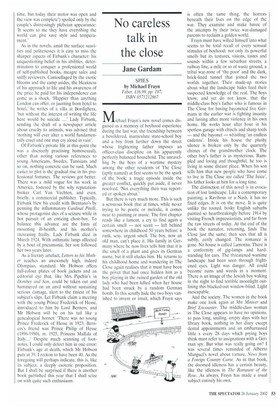No careless talk in the close
Jane Gardam
SPIES by Michael Frayn Faber, £16.99. pp. 197, ISBN 0571212867 Michael Frayn's new novel comes disguised as a memory of boyhood experience during the last war, the friendship between a bewildered, inarticulate state-school boy and a boy from further down the street whose frightening father imposes an officer-class discipline on his apparently perfectly balanced household. The unravelling by the boys of a wartime mystery among the other residents of The Close (aptly named) at first seems to be the spark of the book; a tragic episode inside the greater conflict, quickly put aside, if never resolved_ 'Not everything then was reported or spoken about.'
But there is very much more. This is such a sensuous book that at times, while never trying to be poetic or melodic, it comes near to painting or music. The first chapter reads like a lament, a cry to find again a certain smell — not scent — left behind somewhere in childhood 50 years before: a rank, sexy, urgent smell. The boy, now an old man, can't place it. His family in Germany where he now lives tells him that it is the smell of a plant and gives its German name, but it still eludes him. He returns to his childhood home and wandering in The Close again realises that it must have been the privet that had once hidden him as a boy playing in the ruined garden of the old lady who had been killed when her house had been struck by a random German bomb. In this scruffy hide the two boys vanished to invent or intuit, which Frayn says is often the same thing, the horrors beneath their lives on the edge of the war. They examine and make havoc of the attempts by their twice war-damaged parents to reclaim a golden world.
Frayn must have willed himself into what seems to be total recall of every sensual stimulus of boyhood; not only its powerful smells but its textures, visions, tastes and sounds within a few suburban streets, a railway line, a mile or so of waste ground, a tribal war-zone of 'the poor' and the dark, brick-lined tunnel that joined the two worlds together. Their made-up stories about what the landscape hides feed their suspected knowledge of the real. The boys know, and yet do not know, that the middle-class boy's father who is famous in The Close for having bayoneted five Germans in the earlier war is fighting insanity and lusting after more violence in his own home. He works hour after hour in his spotless garage with chisels and sharp tools — and the bayonet — whistling 'an endless cadenza'. Inside his house the plushy silence is broken only by the quarterly chimes of the grandmother clock. The other boy's father is as mysterious. Rumpled and loving and thoughtful, he too is living in some distant place. When his son tells him that new people who have come to live in The Close are called 'The Juice', his father looks at him for a long time.
The distinction of this novel is in evocation of lost landscape. Like a contemporary painting, a Ravilious or a Nash, it has no fixed edges. It is on the move. It is quite unlike the rooted, bosky English suburbs painted so heartbreakingly before 1914 by visiting French impressionists, and far from the raw streets of today. At the end of the book the narrator, returning, finds The Close just the same; then sees that all is subtly, eerily changed. The romance is gone. No house is called Lamorna. There is a conformity of gig-lamps and hardstanding for cars. The threatened wartime landscape had been seen through frightened eyes. Light was danger. All could become ruins and weeds in a moment. There is an image of the Jewish boy waking in the night to find terrible moonlight outlining this blacked-out window-blind. Light inescapable.
And the society. The women in the book make one look again at Mrs Miniver and Brief Encounter. The middle-class woman in The Close appears to have no opinions, to pass long, smiling, empty days with her library book, nothing in her diary except dental appointments and an embarrassed little x every 28 days which prying boys think must refer to assignations with a German spy. But what was really going on? I was several times reminded of Alberto Manguel's novel about torture, News from a Foreign Country Came. As in that book, the doomed idleness has a certain beauty, like the idleness in The Romaunt of the Rose. As always, Frayn has made a usual subject entirely his own.


















































































 Previous page
Previous page